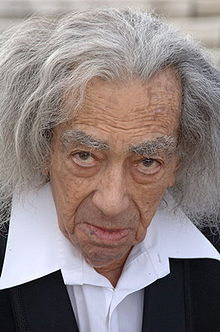György Faludy
- György Faludy
-
György Faludy (22 septembre 1910 à Budapest- 1er septembre 2006 à Budapest) était un poète et penseur juif hongrois.
Né à Budapest dans une famille relativement aisée (son père était professeur d'université), ses poèmes le rendirent célèbre assez jeune. En 1938 il partit vivre en exil à Paris. Après la chute de la France pendant la Seconde Guerre mondiale, il s'enfuit vers le Maroc où il passa presque un an, puis fut invité à résider aux États-Unis par le gouvernement américain. Il devint éditeur d'un journal financé par le mouvement "Hongrie Libre" (Free Hungary), puis rejoint l'armée américaine.
En 1946, il revint en Hongrie et fut emprisonné après quelques années dans le camp de Recsk. En 1956 il s'enfuit une nouvelle fois, et fut résident au Royaume-Uni, au Canada, en Italie et à Malte. En 1967 il émigra vers le Canada et ne revint en Hongrie qu'en 1989.
Il écrivit une autobiographie très acclamée, intitule en anglais "My Happy Days in Hell".
En 1994, il reçoit le Prix Kossuth.
Wikimedia Foundation.
2010.
Contenu soumis à la licence CC-BY-SA. Source : Article György Faludy de Wikipédia en français (auteurs)
Regardez d'autres dictionnaires:
György Faludy — (September 22 1910, Budapest September 1 2006, Budapest), sometimes anglicized as George Faludy, was a Hungarian Jewish poet, writer and translator.Notable worksFaludy s translations of the ballads of François Villon, and even more prominent… … Wikipedia
György Faludy — (2006) György Faludy (* 22. September 1910 in Budapest; † 1. September 2006 ebenda) war ein ungarischer Schriftsteller. Inhaltsverzeichnis … Deutsch Wikipedia
György Faludy — Nacimiento 22 de septiembre de 1910 Budapest, Imperio Austrohúngaro … Wikipedia Español
Gyorgy Faludy — György Faludy György Faludy (22 septembre 1910 à Budapest 1er septembre 2006 à Budapest) était un poète et penseur juif hongrois. Né à Budapest dans une famille relativement aisée (son père était professeur d université), ses poèmes le… … Wikipédia en Français
Faludy — György Faludy (* 22. September 1910 in Budapest; † 1. September 2006 ebenda) war ein ungarischer Schriftsteller. Inhaltsverzeichnis 1 Leben 2 Rezeption 3 Werke (Auswahl) 4 … Deutsch Wikipedia
György — ist ein ungarischer männlicher Vorname. Herkunft und Bedeutung Die deutsche Form des Namens ist Georg. Bekannte Namensträger György Cserhalmi (* 1948), ungarischer Schauspieler György Csete (* 1937), ungarischer Architekt György Csordás… … Deutsch Wikipedia
György Gábori — ( en. George Gabori) (born 1924) is a Hungarian Jewish author. His best known book is When evils were most free [cite web|title=Memories of Hungary: A Review Article of New Books by Suleiman and Teleky|author=Steven Tötösy de Zepetnek|publisher=… … Wikipedia
FALUDY, GYÖRGY — (1913–2006), Hungarian poet and author; born in Budapest. He translated François Villon s poetry into Hungarian (Villon balladái, 1937). In 1939 Faludy fled to France and eventually settled in the United States, where he volunteered for service… … Encyclopedia of Judaism
Faludy, Gyorgy — ▪ 2007 George Faludy Hungarian born poet and journalist (b. Sept. 22, 1910, Budapest, Hung. d. Sept. 1, 2006, Budapest), was best known for Villon balladái (1937), his lyrical reinterpretations of the verse of 15th century French balladeer … Universalium
Faludy, György — (b. 1910) Hungarian poet. Born in Hungary, he studied in Vienna. In 1938 he left Hungary for France; later he went to Casablanca, and eventually to the US. In 1945 he returned to Hungary and became the literary editor of the Social Democratic… … Dictionary of Jewish Biography

